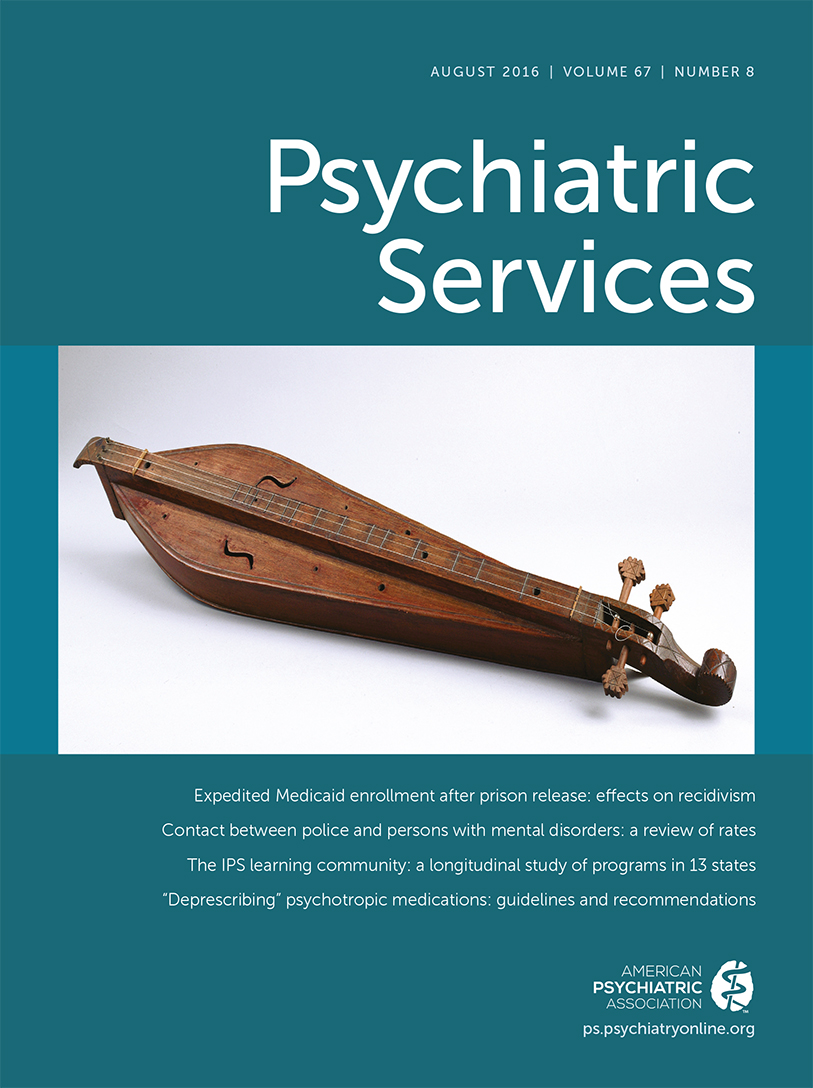This Month’s Highlights
Expedited Medicaid Enrollment: Is It Enough?
Initiatives to expedite Medicaid enrollment on community reentry are aimed at ensuring that individuals receive treatment in the community after an incarceration or hospitalization—treatment that is expected to help them avoid further institutionalization. Two studies of a Washington State policy showed that referring persons with severe mental illness for expedited Medicaid before they reentered the community was successful in boosting enrollment and use of mental health services; however, the services provided did not help former inmates avoid criminal recidivism. In the first study, Gary S. Cuddeback, Ph.D., and colleagues examined postrelease patterns of Medicaid approval and use of mental health services among more than 1,200 persons in Washington State during 2006, the policy’s first year. Approval rates were higher for former inpatients (91%) and state prisoners (83%) than for former jail detainees (66%). Among those approved for Medicaid, mental health service use in the critical first 30 days was highest among former inpatients (95%) but much lower for those released from jails (59%) and especially for those released from prisons (36%) (page Original article: 835). In the second study, Joseph P. Morrissey, Ph.D., and colleagues examined data for state prisoners released during the policy’s first two years, comparing those referred for expedited Medicaid (N=895) and a propensity-weighted group of those not referred (N=2,191). No evidence was found that expediting Medicaid reduced rearrest or reincarceration (page Original article: 842). In a Taking Issue commentary, Henry J. Steadman, Ph.D., emphasizes the need to ensure that ACA’s essential health benefits for Medicaid enrollees include interventions that target criminogenic risk factors (page Original article: 821).
Police Contact With Persons With Mental Disorders
A literature review this month reveals the significant role played by law enforcement in the lives of persons with mental illness in many Western nations. James D. Livingston, M.A., Ph.D., identified 85 English-language studies from the United States and other countries covering 329,461 cases. Among the findings: one in four people with mental disorders have histories of police arrest, one in ten have police involved in their pathway to mental health care, and one in 100 police dispatches and encounters involve people with mental disorders. In the United States, rates were higher. Police were involved in seeking treatment for nearly 30% of persons with mental illness who had a police contact in the lead-up to treatment, and nearly 6% of police calls involved a person with mental illness (page Original article: 850).
A Learning Community to Foster an Evidence-Based Practice
The Individual Placement and Support (IPS) learning community is a network of partners in the United States and three European countries working to disseminate, expand, and sustain this evidence-based model of supported employment. To examine sustainment of IPS in the United States, Gary R. Bond, Ph.D., and colleagues, interviewed IPS team leaders in 129 programs that were actively participating in the learning community in 13 states in 2012 and 2014. The authors asked questions about program status, funding, and quality improvement activities and also looked at program-level data on IPS fidelity and employment rates. In 2012, the 129 participating sites had been active for an average of 4.5 years. At the two-year follow-up, 124 sites were sustained—an unusually high rate of survival for an evidence-based program. The sustaining sites maintained quality improvement activities, expanded funding sources, and increased employment rates and fidelity scores. Learning communities are a promising approach to sustainment of evidence-based practices, the authors conclude, and further study is warranted (page Original article: 864).
“Deprescribing” in Psychiatry
“Deprescribing” is a term initially coined in geriatric medicine that refers to optimizing a pharmacologic regimen by reducing the dosage of or stopping a medication for which benefits no longer outweigh risks. In this month’s Open Forum, Swapnil Gupta, M.B.B.S., M.D., and John Daniel Cahill, M.B.B.S., B.Med.Sci., describe how the process of deprescribing might be implemented in psychiatry. They note that changes in biological, psychological, and social factors over time should prompt reappraisal of the risk-benefit ratio, and they outline steps in a patient-centered deprescribing process, including such challenges as distinguishing symptoms of medication withdrawal from those of relapse. A future direction in psychiatry, they suggest, is the formation of multidisciplinary “deprescribing committees” within individual systems of care to develop a hierarchy of medications that could be reduced or discontinued and a plan to manage emerging issues (page Original article: 904).
Briefly Noted
| • | Citing stigma and concerns about patients’ military careers, many Army clinicians reported not recording PTSD diagnoses in electronic health records (page Original article: 878). | ||||
| • | A Dutch program was successful in training clinicians to help patients complete a crisis plan to guide future care (page Original article: 858). | ||||



